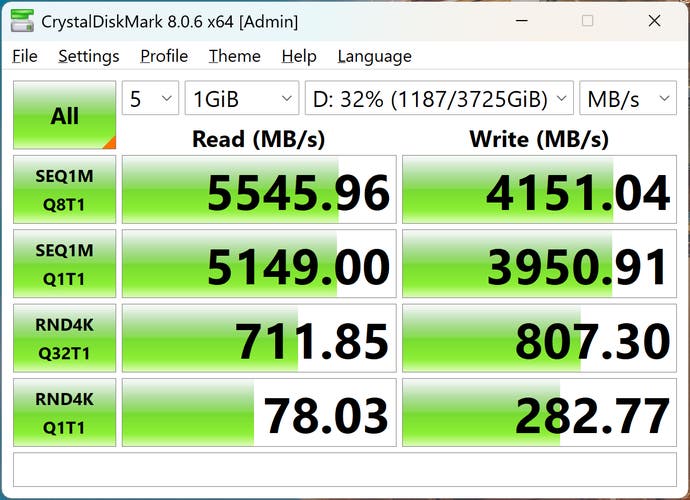WD's 4TB Blue SN5000 SSD has dropped under £200 - here's our mini review
A great deal for a quick PCIe 4.0 SSD.
The WD Blue SN5000 is a surprisingly rapid budget NVMe SSD, offering read speeds up to 5500MB/s and write speeds up to 4850MB/s through a PCIe 4.0 connection. We used the SN5000 for our Intel Core Ultra 285K and 245K CPU benchmarking, and we were impressed with the level of performance on offer for a drive with QLC NAND and a DRAM-less design versus drives with the more traditional TLC + DRAM combo.
The WD SN5000 4TB has been discounted to below £200/$200 for Black Friday and Cyber Monday, so we thought it would be a good idea to publish this brief review while the discount was still live. First, here's the link to those deals:
- Get the 4TB WD Blue SN5000 for £199.99 (was £275.99)
- Get the 4TB WD Blue SN5000 for $199.99 (was $299.99)
Now, on with the mini review. We tested the drive by running a selection of synthetic and game load time benchmarks on it, starting with the classic CrystalDiskMark. Here, we saw the drive match its promised specifications, with a 5456MB/s max read speed and 4151MB/s max write speed. The random 4K read/write tests are also interesting, showing competitive speeds as well of 712MB/s and 807MB/s respectively. Drives tend to be faster reading than writing, but this trend does tend to flip around when drive capacities get larger - and that's clearly the case here with this 4TB model.


Atto Disk Benchmark is another interesting test that we've used historically as it shows the relationship between data set size and read/write speeds in considerable detail. Here, we reach reasonable write speeds from around the 64KB mark (3.42GB/s), with an overall peak at 4MB chunk sizes (4.74GB/s). Read speeds are less consistent, with an overall peak at 1MB chunk sizes (5.13GB/s) and relatively quick performance from 512KB to 64MB (~3GB/s).
Finally, the SN5000 is rated for an impressive 690K IOPS for reads and an even higher 900K IOPS for writes, and that's reflected in our testing. Loading up Baldur's Gate 3 to a late-game save in the titular city, the SN5000 took 21 seconds to hit the main menu and then 53 seconds to load the most recent save game, versus 22s/54s for the Samsung 990 Evo Plus 2TB (a recent TLC+HMB PCIe 4.0 drive) and 24s/56s for the Samsung 960 Evo 1TB (a 2016 TLC+DRAM PCIe 3.0 SSD). It's only a second, sure, but multiplied across hours of gameplay and tons of different games, it starts to add up - and it's impressive that this QLC drive outperforms a TLC contemporary by any margin whatsoever.
Overall, the SN5000 is a fine drive that performs well in both real-world and synthetic tests, and and it's worth considering at this discounted price point if you're after a capacious 4TB SSD for your PC or PS5.

